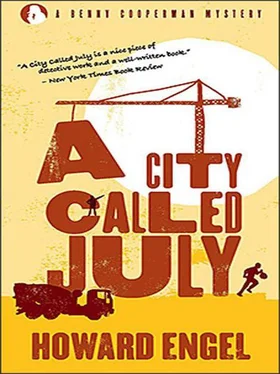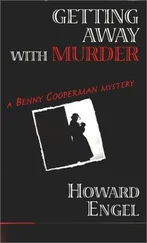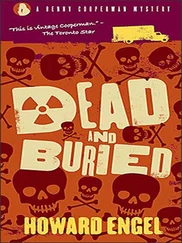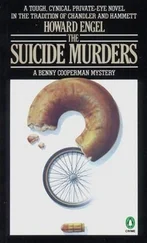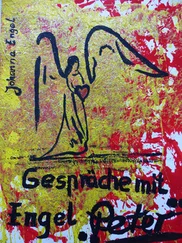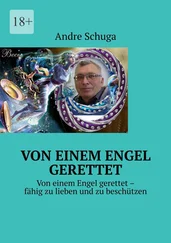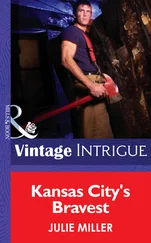Howard Engel - A City Called July
Здесь есть возможность читать онлайн «Howard Engel - A City Called July» весь текст электронной книги совершенно бесплатно (целиком полную версию без сокращений). В некоторых случаях можно слушать аудио, скачать через торрент в формате fb2 и присутствует краткое содержание. Год выпуска: 0101, Жанр: Криминальный детектив, на английском языке. Описание произведения, (предисловие) а так же отзывы посетителей доступны на портале библиотеки ЛибКат.
- Название:A City Called July
- Автор:
- Жанр:
- Год:0101
- ISBN:нет данных
- Рейтинг книги:3 / 5. Голосов: 1
-
Избранное:Добавить в избранное
- Отзывы:
-
Ваша оценка:
- 60
- 1
- 2
- 3
- 4
- 5
A City Called July: краткое содержание, описание и аннотация
Предлагаем к чтению аннотацию, описание, краткое содержание или предисловие (зависит от того, что написал сам автор книги «A City Called July»). Если вы не нашли необходимую информацию о книге — напишите в комментариях, мы постараемся отыскать её.
A City Called July — читать онлайн бесплатно полную книгу (весь текст) целиком
Ниже представлен текст книги, разбитый по страницам. Система сохранения места последней прочитанной страницы, позволяет с удобством читать онлайн бесплатно книгу «A City Called July», без необходимости каждый раз заново искать на чём Вы остановились. Поставьте закладку, и сможете в любой момент перейти на страницу, на которой закончили чтение.
Интервал:
Закладка:
“Yeah, I can think of a lot of people in this town who can’t wait to give him a medal.”
“Don’t start in with me, Cooperman. I have to live here too. He gets away with two million and I have to face those people. Sweet prospect, eh?” He folded his arms across his chest like he was having a hard time breathing, then asked, “When do you think we’ll be reading about it?”
“Tonight, maybe tomorrow. The lid’s half off now. There’s no advantage for the cops to keep it a secret.”
“I’d skip out of town myself until this thing blows over if it wasn’t for Ruth and the kids. They’re going to need all the help I can give them. Debbie can’t do everything.”
“Are you on good terms with your ex-wife?”
“You’re changing the subject, aren’t you?” He put out his cigarette butt in a distributor cap he was using as an ashtray. “Debbie and I are cordial, that’s what we are.” He didn’t want to embellish that and appeared to be looking forward to the next question on a different subject.
“I hear otherwise. It was a messy divorce.”
“Okay, okay. She took me to the cleaners but good. But that was ten years ago. I don’t hurt so much any more. I’ve got a happy situation going in my life, so I can afford to forgive and forget. I don’t like fighting in public.” He lit another fuzzy-looking cigarette which he took from his jacket pocket. “Neither of us wants anything bad to happen to Ruth and those two kids of hers. I’ll back her on that. She has her moments, Debbie. Sometimes she can be as sweet as pie.”
“What about your sister-in-law? Is she going to be all right?’
“What are you, Ben, all heart all of a sudden? Ruth’s in for one hell of a bad time. There isn’t any mud that’s not going to be thrown at her. And you’re not exactly a disinterested spectator, are you?”
“I’m trying to find her husband. Is that so bad? Are her shoulders broad enough to take some of the heat?”
“Sorry, Ben. I forgot my manners. You know how it is?” I agreed that I knew how it was.
“Do you think that Larry got into this mess because of the economy, being pressed by creditors and so on, or as a matter of policy? Did he plan the whole thing, or did it just happen?”
“That’s the big question, isn’t it? If I could see the books he kept, I could get some idea, but without them, I’m only a guesser like the rest of you.”
“The cops will have his books.”
“So, go bother them.”
“Did Larry take any part in your business here?”
Sid licked the hair on the knuckles of his right hand as he thought about his answer. Finally he said: “He did some legal staff for me. Nothing important. He didn’t even get paid for it. Never invoiced me, and I guess I never pushed him to.”
“Did he owe you money?”
“Christ, they all owe me money! I put him through school so he could learn the law and find out about three-piece suits and which fork to use at parties I wouldn’t get invited to. I’m still doing the same for his brother, only I don’t get my name in The New York Times like Nate does.”
“You were the head of the family.” That gave him breathing time. He was getting a little excited.
“Yeah, I was the head of the family. I had to look out for the family.” His eyes were shining when he looked up for a moment. He didn’t look me in the eye. I tried examining the pictures on the wall until he asked if I had any other questions.
“Was there anyone outside the family he trusted and might have talked to?”
“No.”
“Is there any place apart from his office and house where he might have left some record of …”
“No. Next question.”
“Does he have a favourite watering hole in Florida or Arizona that you know about it?” That’s when I got thrown out. He wasn’t rude about it. He didn’t stop smiling at me through his clenched teeth. It was just that suddenly he wasn’t sitting behind his desk any more, he had me tightly by the elbow and we were moving towards the office door at some speed. After I got the ignition started, I could still feel his grip on my arm. I splashed my way out of there fast, nearly skinning the Olds on a silver Audi driving through the gate. There was a woman at the wheel. She didn’t stop to get acquainted.
Once again the Bolduc fence followed me for a quarter of a mile along Facer Street. I rolled down the window. Under the sun, the interior had become a sauna without an oak branch. I was warm from my interview with Sid Geller too. Through a windshield pockmarked with yellow mud, a blue sky smiled over the landscape of one-storey houses built during and after World War Two to meet the housing shortage. These bungalows began life as alike as sardines, but now they all had sprouted eccentricities: aluminum awnings, added second floors, porches, extensions, chimneys. While across the road one industrial site gave way to the next. Sandwiched between two such sites, and opposite more depressing grey houses, I came on the two-storey warehouse that a little digging had told me served as Nathan Geller’s studio.
I parked the car near a nest of green garbage bags and rang a bell. I couldn’t hear it make a sound inside, so I tried the door and found it open.
I was in the biggest room outside a theatre I’d been in for some time. Except for a balcony-like second floor, which beetled over the work area, the room went up to the ceiling. A skylight let in the day and the light pooled in cool circles like theatrical work lights on a stage. In these white spots and bathed in the illumination stood life-sized human figures in plaster. In spite of a rough surface, I recognized the familiarity of these types: a fruit-vendor weighing vegetables, a fat woman on a park bench holding one shoe in her hand, a tourist photographing an unbending Mountie, a bag lady with her supermarket cart loaded with her possessions. That’s the sort of thing. These were finished pieces, and arranged to create the effect I’d walked into. Nathan Geller was an accomplished sculptor and it was the first time I’d heard about it.
From under the overhang of the balcony, I could hear hammering. I followed the racket until I found whom I took to be Nathan Geller hammering at a wire armature that was as big as he was. He was dressed in farmer’s overalls and wore a railway engineer’s cap turned back to front. Welder’s glasses covered his eyes, although the torch was turned off near by. When he saw me walking towards him, he paused and pushed the goggles up on his sweaty forehead.
“Mr. Rylands? I didn’t expect you until tomorrow. Didn’t Munby tell you? I left a message yesterday. But as long as you’re here …”
“My name is Cooperman,” I said, putting on a smile. “The bell doesn’t work.”
“You’re not from Munby?” he said, trying to get a grip on the fact.
“Not so far. I’ve never heard of either of them. I came to talk to you about your brother.” He pulled the goggles off completely now and double checked the valve in the welding torch.
“I heard about you. Debbie phoned and told me to be good. Come on upstairs.” He led the way from this work area up a flight of industrial stairs to a small comfortable room with a rug on the floor and books in shelves, a television set on a small refrigerator and a comfortable-looking couch and matching chair. It was a copy of any of thousands of rec rooms built during the sixties in finished basements. Geller had a fine eye for detail.
He also had the family nose and cleft chin with dimples on either side of a frank mouth. He had more hair than his brother but it didn’t look like what he had would outlast the decade. Without asking, he went to the refrigerator and removed bottles of imported beer. He settled one with a tall glass near me and began working on his own from the bottle. “This gets to be hot work this time of year,” he said. “I always seem to be casting bronze in July and doing outdoor sketches in January. Well, so you know about Larry. Welcome to the club. Club, hell, it’s more like a convention,”
Читать дальшеИнтервал:
Закладка:
Похожие книги на «A City Called July»
Представляем Вашему вниманию похожие книги на «A City Called July» списком для выбора. Мы отобрали схожую по названию и смыслу литературу в надежде предоставить читателям больше вариантов отыскать новые, интересные, ещё непрочитанные произведения.
Обсуждение, отзывы о книге «A City Called July» и просто собственные мнения читателей. Оставьте ваши комментарии, напишите, что Вы думаете о произведении, его смысле или главных героях. Укажите что конкретно понравилось, а что нет, и почему Вы так считаете.
